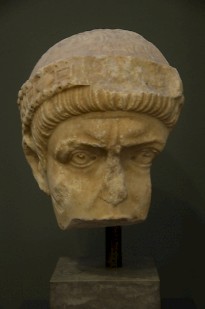Zosimus, New History 4
Zosimus (Greek Ζώσιμος): Early Byzantine, pagan author of a history of the Roman Empire, published in the first quarter of the sixth century CE.
Book 4

The fourth book of Zosimus’ New History deals with the House of Valentinian - Valentinian I himself, who ruled from 364 until 375, his brother and co-ruler Valens (r.364-378), and Valentinian’s son and successor Gratian (r.375-383). Zosimus treats them quite fairly, without exaggerating the cruelty of the trials that is, for example, typical of an Ammianus Marcellinus.
After the battle of Adrianople (378), in which Valens is killed in action, Gratian makes Theodosius his co-ruler in the east.note Zosimus’ portrayal of this Christian ruler is extremely hostile. He blames Theodosius for almost everything that can go wrong and for everything the author believes to be wrong. The empire’s army has too many officers,note the units are undisciplined,note eunuchs become too powerful,note and so on. Money is being squandered without consideration,note forcing the emperor to raise the taxes.note The people start to believe that barbarian rule is preferable.note
After the assassination of Gratian, his younger brother Valentinian II flees to Thessaloniki and asks Theodosius to help him in his war against the murderer Magnus Maximus, but Theodosius ignores the boy’s pleas – until he meets his sister Galla. She is beautiful and now Theodosius finally is interested in doing his job.note After an incredible story about Theodosius' war against bandits,note the fourth book ends with his war against the usurper Eugenius.
Zosimus’ main source in this book is the Universal History by Eunapius, but he also refers to the philosopher Syrianus, who wrote about the miraculous way Athens was saved from an earthquake. Herodotus of Halicarnassus is also a source of information.
Contents
- Beginning of the reign of Valentinian and Valens
- Purge among Julian's pagan friends
- Division of the empire
- Early career of Procopius
- Revolt of Procopius
- Procopius seizes Constantinople
- Valens prepares for war
- Valens defeats Procopius
- Trouble in the Rhineland
- Valens' Scythian war
- Valens' Scythian victory
- Affairs in the West
- Valens in Antioch
- Valens suspects the philosophers
- Executions
- Affairs in the West
- Death of Valentinian
- Earthquakes; Athens saved
- Accession of Gratian and Valentian II
- The Huns
- An omen
- The Saracens repell the Scythians
- Sebastianus
- Battle of Adrianople
- Fighting in Thrace
- Massacres in Syria
- Theodosius reorganizes the army
- Theodosius' misadministration
- Suffering of the people
- Transfer of units
- Undisciplined troops in Macedonia
- Fiscal measures
- Moral decline
- Theodosius restores some order
- Magnus Maximus proclaimed emperor
- Gratian's refusal of the pontificate
- Magnus Maximus recognized
- The Greuthinges
- Promotus defeats the Greuthinges
- The hero Gerontius
- Theodosius and Antioch
- Magnus Maximus invades Italy
- Valentinian II escapes to Thessaloniki
- Justina convinces Theodosius to attack Magnus Maximus
- Theodosius advances to Italy
- The end of Magnus Maximus
- Theodosius reinstalls Valentinian II
- Banditry
- Fight against the bandits
- Theodosius' nature
- Fall of Promotus
- Fall of Tatianus and Proclus
- Conflict between Valentinian II and Arbogast
- Death of Valentinian; Eugenius emperor
- Theodosius considers war
- Quarrel between Eriulph and Fravitta
- Theodosius prepares for war
- Battle of the Frigidus
- Death of Theodosius